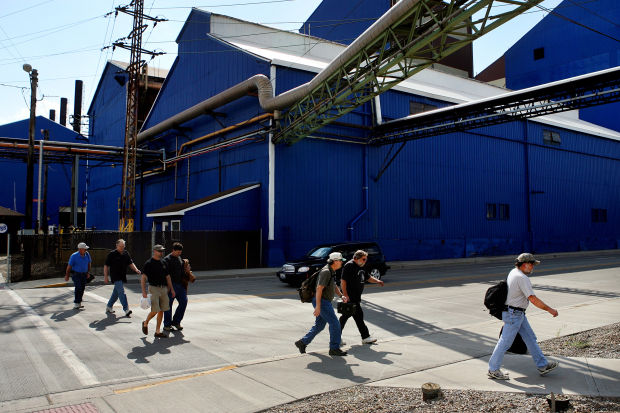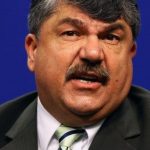
Washington – Steelworkers facing potentially long layoffs took their case to Washington last week but said they were disappointed in the response they received.
A delegation of six union officers and members met with Congressman Mike Bost (R-IL) on April 15 seeking his support for measures to create a level playing field in the steel industry, including opposing the pending “Fast Track” trade authorization bill.
But Bost, a Republican from Murphysboro elected last fall, would not provide the support the group was looking for in opposing Fast Track or leveling the playing field in future trade deals.

Fast Track would allow no amendments and limited debate on trade deals such as the pending Trans-Pacific Partnership, leaving legislators free to agree to provisions in trade deals that will send jobs overseas, reduce the bargaining power of workers, jeopardize health and safety regulations and give corporations more control over our economy and our trading partners’ economies.
“While Bost made overtures of support in assisting Steelworkers who could possibly be laid-off as early as the end of May if U.S. Steel follows through with the plant idling of Granite City Works, his response to specifically supporting the United Steelworkers’ opposition to Fast Track legislation was disappointing,” the union reported.
The delegation included Steelworkers District 7 Director Mike Millsap, District 7 Rapid Response Coordinator Jerome Davidson, Local 1899 President Dan Simmons, Local 1899 Rapid Response Committee Chair Terry Biggs and committee members Don Cathey and Randy Virgin. They brought petitions signed by 1,500 members of Locals 1899, 50 and 68, collected during one recent shift change.
Bost told them he had asked the Obama Administration for stronger enforcement of existing trade laws, which the union maintains are antiquated and too slow to stop layoffs, job loss and business closure.
“However, to the disappointment of the Rapid Respond delegation, when the topic of standing with Steelworkers against the Fast Track bill was raised, Bost offered little more than reasons and examples as to why the bill is necessary,” the union reported.
FOUR KEY MEASURES
The delegation was seeking support for four key measures:
• New trade laws – stronger than the current ones, which have resulted in the lost of more than one million jobs and the shuttering of more than 60,000 factories.
• Trade agreement tools – capable of deterring and penalizing unfair trade practices.

• Currency enforcement – to stop other countries from manipulating their currency.
• Defeating Fast Track – and the way it would allow the pending Trans-Pacific Partnership trade deal to be implemented without Congressional oversight.
“We can no longer be silent with the threat we face,” Simmons, the president of Steelworkers Local 1899, said. “Last month, U.S. Steel served notice on 2,080 steelworkers employed at our Granite City steel mill of an intent to idle operations as the result of market conditions and an illegal flood of steel imports from China, South Korea, Japan and other countries that unfairly subsidize products and that now threaten to put us out of work.”
ALTON STEEL
Even while the Granite City members were in Washington to state their case, the damaging effects of the current steel market were seen again in the Metro East when Alton Steel announced it was indefinitely laying off 62 steelworkers, about a quarter of its workforce, as of April 12 and “until business conditions improve.”
The company cited reduced demand for its steel bar products, connected to reduced oil and gas drilling caused by lower energy prices. It cut the melt shop shifts from two to one a day and the bar mill shifts from three to two.
Company President Jim Hrusovsky said the company can meet its current obligations with the smaller workforce.
STRANGE PARTNERS
The Republican-led Congress and President Obama seem to found something they can agree on in the Fast Track bill.
The usually fractured Democrats appear to be aligning on this issue, but ironically, in opposition to their own president. Environmentalists and Latino groups are joining Labor in opposition.
Fast Track, among other things, would allow Congress to approve without amendment the biggest trade deal since NAFTA – the Trans-Pacific Partnership or TPP, which is intended to reduce barriers between 12 nations along the Pacific Ocean in North America, South America and Asia.
‘WE CAN’T AFFORD
ANOTHER BAD DEAL’

AFL-CIO President Richard Trumka is among the labor leaders opposing Fast Track.
“For decades, we’ve seen how fast-tracked trade deals devastated our communities through lost jobs and eroded public services,” Trumka said. “We can’t afford another bad deal that lowers wages and outsources jobs.”
“We want Congress to keep its leverage over trade negotiations – not rubber-stamp a deal that delivers profits for global corporations but not good jobs for working people.”
Trumka said the Trans-Pacific Partnership deal would cover 40 percent of the world’s Gross Domestic Product.
“A deal this big should be debated in a full and open manner like every other piece of legislation,” he said. “Working people are showing tremendous courage standing up to the low-wage, corporate agenda. It’s time for politicians to do the same.”

